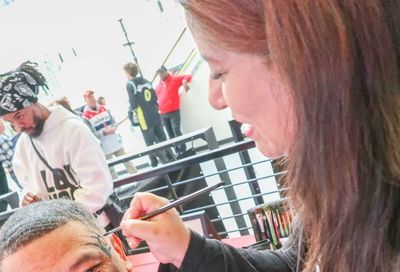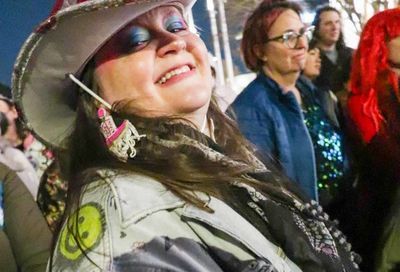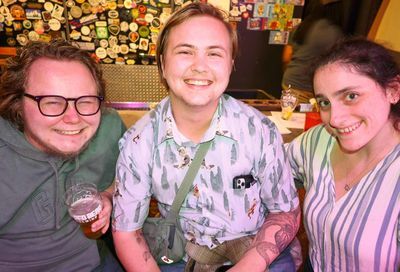Post Gay
'Style' Writer Hank Stuever

A bit of clarification: This is a story about Hank Stuever, a Washington Post Style section writer who, as it happens, is a gay man. Hence the “Post Gay” pun.
Despite the pun, this is not a story about “post gay” life — the idea that we’ve moved from a more activist to a more normalized gay identity — although it does come up implicitly and explicitly when discussing the 33-year-old Stuever’s newspaper career, mostly because being gay is something that both matters and doesn’t matter. This will make more sense shortly.
Finally, this is not a story about which reporters at the Post are gay. If you want to know that, you’re going to have to call over and find out for yourself.
Are we all clear now? Then let’s move on.
For Stuever, simply being gay isn’t that interesting.
“The big secret of being gay is ‘guess what, nobody cares,'” he says. “We care — we’re gay. But largely, people don’t care.”
A bit of background: After his formative years in Oklahoma City — his gay childhood includes stints as a fabulous five-year-old, an elementary school Wonder Woman, and a high school newspaper editor — Stuever headed off New Orleans to study journalism and theology at Loyola University. His first full-time reporting job came in the early nineties, in Albuquerque, New Mexico. After a stay in Austin, Texas, he came to the Post Style section where he had been an intern almost a decade before.
Stuever caught the interest of many gay and lesbian Post readers when he wrote what everyone else had been thinking about conniving Survivor victor Richard Hatch — that he was an “evil queen.” He writes occasionally on gay subjects, but for the most part prefers to bring a more subtle gay sensibility to stories about anything from the Brawny paper towels lumberjack mascot to a young couple’s quest to get their oversized couch up a narrow set of stairs.
“I liked my piece about the American man and his hairy back,” Stuever says. “Lots of things got said in that article that needed to be said. And that one drew in gay too, without being an article about gay.”
A bit of summary: Simply being gay isn’t that interesting. Being gay and having a story to tell — that’s interesting.
MW: You studied journalism and theology at a Jesuit university. Are you Catholic?
HANK STUEVER: I was born and raised Catholic. I went to Catholic school all my life. I was very religious as a teenager. I was stupid and wild and crazy, too, but I really had an affinity for Catholicism. We were pretty strong Catholics in my family, but in a very liberal, seventies kind of way. I went to the kind of church where you wore your good jeans and we had guitar mass. It wasn’t a strict, strict church. It was, to me, a better Catholicism. I still like to go to church every now and then, with my grandpa or my mom.
MW: Do you ever go by yourself?
STUEVER: Once in a great while. Not on holidays — I could go on, like, in August. Catholicism to me is like a scrapbook: you look through the pictures every once in a while, but you don’t look at them every day. I like the rhythm of the mass, I like to people watch, I like to look at all the stained glass. If it’s one of those fabulous 1960s churches that look like a UFO landed in the suburbs, I like that. Invariably I pick the Sunday where they give a sermon that kind of ticks me off and reminds me why I don’t go. I stay to the end of mass, though. You always have to stay until the end of mass.
MW: It sounds as if your parents were fairly liberal, at least in their religious leanings. How about when you were coming out, were they liberal with that? Or do your mother and father have different takes?
STUEVER: I don’t really identify with people’s coming out stories. It just seems so dramatic [to think] that there was this day that you weren’t gay and then there was this day that you were. In fact, all of us were probably extremely fabulous five-year-olds who swished around the house and made it very clear what we were, whether anybody was able to read that text or not. I was a fabulous five-year-old and my mother knew it. Her brother really did all of the heavy lifting here, because he and his partner have been together for almost as long as I’ve been alive, and there’s no politicking to do in my family about gay being normal. So I haven’t really had that scene. My dad and I have a complicated relationship and don’t speak anymore, but of the reasons why we don’t speak, gay is far down the list.
I was a weird kid. I’m probably doing that David Sedaris thing and embellishing it greatly, but my dad pulled up in the driveway one day and I was out in the front yard dressed as Wonder Woman. I had tied up three neighborhood kids to our little suburban tree. I had on my sister’s tube top, knee-high red socks, and aluminum foil wrapped around my wrists. I’m the youngest of four, the only boy, so there was a hullabaloo around the fact that my father finally had a son. I’m sure that had something to do with it, that he’s not the dad for me and I’m not the son for him. The Wonder Woman episode really set it for us without either of us knowing it. What do you know about yourself at eight years old, other than there are certain ways to behave and not to behave, and you’ve just stumbled on a really big no-no.
MW: You didn’t have the big cathartic coming out — did you go through the so-called gay adolescence at some point?
STUEVER: No, I was fairly earnest in my early twenties and working at the evening newspaper in Albuquerque. I hate to say I’ve always been childish, but clearly I’m in touch with my adolescence. I work like a grown up, I keep grown up hours, and I have grown up concerns, but I also have a lot of childish, teenager concerns. Which is good, because that’s what I’m paid to do sometimes — be a little bit immature, a little bit off message. I didn’t get a late start being gay, that’s for sure, so I don’t think I sublimated much that I had to make up for.
MW: These days it seems more gay and lesbian reporters are choosing to start careers in smaller cities or towns like Albuquerque than they were a decade or two ago.
STUEVER: I love Albuquerque. I love Texas — okay, officially I hate Texas, but I love writing about it. I think those places are actually more interesting places to be gay. I like a challenge, I like a little oppression. I don’t like the gay ghetto, I don’t relate to it. I’ve always been gay in the newsroom. At some point in my twenties I got to that [place where] you really feel like you’ve got to keep the issues in the newspaper. And the worst journalism I’ve ever done has been when I was too full of my gay mission. The best writing about gay I’ve ever done is when I wasn’t thinking about it.
MW: Do you get pressure from gay groups to be the go-to gay guy at the Washington Post?
STUEVER: I did a story about the gay and lesbian response to September 11. I went about it very seriously, although the first line of that story was, “Let us consider the fag bomb.” I used [the “hijack this fags” graffiti] as a springboard to bring up issues of equal rights, domestic partner rights, benefits, blood donation, gay firefighters, Mark Bingham — all of it. A prominent gay rights group was very upset that I didn’t mention all of their work, that I had not gone to them so they could properly direct me to all of their contacts. We went round and round because I didn’t mention them. And the message was clear: I had sinned against the ruling order and I should have known better because I was gay.
I already have to be careful about not ghettoizing myself, and not ghettoizing everybody else. There are a finite number of stories I would want to write that are gay related. There is an infinite number of gay references that I’m willing to inject in almost any story. That’s what I do better than trying to please various groups. I think people make those connections so much better than if I was doing story after story about “the Community” with a capital “c”. I think it’s better to just be sort of cheekily, sneakily gay. I’m not the special gay reporter, gay is not my beat. I’m not here in a political sense, but maybe I’m getting a little bit more done in the long run. Maybe.
MW: Do you consider yourself involved with or part of the gay community?
STUEVER: I don’t want to go down as one of those personal ads that says “Not into bars, no fats, no fems.” I love fats, I love fems, I love the bars. I hate the smoke, I hate the music, but that doesn’t stop me from going. I may not be the world’s best gay guy, I may not be doing it quite to code, but I identify with it. One thing in particular I do love about gay bars is that it has completely replicated the experience of the high school cafeteria for me. I have that same anxiety — where should I stand? “I don’t want to stand by them, there’s too many people over here like this, and there’s too many people over there like that, and oh, thank god there’s somebody I know I can go stand by.” Rather than look at that as a negative, I look at that as that’s life. In a very false way the gay bar scene can be very true. I’m not on board with people who say, “I never go out.” You wouldn’t want to date somebody who goes out every night, and I’d be just as leery of a guy who says he never goes out. What’s he working with? What’s fun for him? “I like to garden?” But what do you like to do with people?
MW: What do you like to do with people?
STUEVER: [Laughs.] I like to eat. I like to sit around and listen to records that I just bought. I like to hang out where we can hear each other. I am a bit of a loner — I’m a social creature but I spend a lot of time alone. I don’t have any purposeful hobbies. I don’t make anything, I don’t devote myself to anything, I don’t belong to any clubs. I’m not secretly involved in anything.
MW: After spending the day writing, you’re not up for doing some sculpture?
STUEVER: My job’s so creative, I think it inhibits any sort of creative outlet I would need otherwise. If I need anything it would be something more serious at the end of the day than writing an essay about why Harry Potter is stupid. Harry Potter is turning our children into nerds and dorks, one by one.
MW: What should they be reading instead?
STUEVER: Any other book. Because they’re reading Harry Potter over and over and over again, and people say, “Children are reading again!” Are they going to read anything else, because this smells like Nancy Drew to me.
MW: Were you a reader when you were a kid?
STUEVER: To the point of punishment — “Get down here right now!” I read a lot and I drew a lot. I drew comic books. [Laughs.] I did a comic book about myself. I basically turned myself into Archie and I had curvaceous, giggly friends and we probably had a band.
MW: What do you read these days?
STUEVER: I’ve been reading a lot of non-fiction books lately just to get an idea of how they’re done, with the eye that someday I would be able to do one. Also the occasional novel and heaps of magazines. How can you ever keep up? There’s New Yorker, New York Observer, New York — I know more about New York than anyplace else and I’ve never lived there. I try to stay literate in all comic books, because that’s kind of a beat for me. I can do a good comic book story if one comes along that’s worth doing in Style, just like I can do a good gay story if one comes along.
MW: There is the idea that we’ve moved into a “post-gay” era. Do you think we’re there yet?
STUEVER: I don’t mind embracing post gay as a concept, because it doesn’t affect the fact that I am different. The best example at the Post right now was the column that Gene Weingarten and I did. Gene Weingarten is the funniest man working in American newspapers. And when Weingarten said he wanted to do [a piece on] who’s funnier, straights or gays, I had a moment of hesitation: “Everybody will know I’m gay.” And I’m like, “You idiot, everybody knows you’re gay.” But I still had that hesitation. Until I don’t have that hesitation, then there’s still some reason to nametag things as gay, straight or whatever. It’s [a matter of] normalizing it. It feels very normal to work at the Washington Post. Being gay is not what I think about when I walk into the Washington Post every day. I think about what am I going to write about and is it going to be good? I never think, oh gosh, I’d better tone it down because I might be being too gay.
I think newspapers have always been oddly accommodating to the gay man. I’m going to really stereotype here, but newspapers have always needed a queen to run — oh, this is so stereotypical, but it’s so true — graphics, features, food, dance, theatre. How are you going to cover all that if you don’t have some queens in the newsroom telling people what to do? And to further stereotype, and to further make people angry, god bless those lesbians who worked in the sports section, who brought tennis onto the front of the section. And ultra super god bless the gay guys covering the White House or the Pentagon or the Redskins, and didn’t become gay superstars because of it. They just became really kick ass reporters. I don’t yet know the incredibly admirable gay guy who is in charge of the newspaper, but I’m sure I will.
Support Metro Weekly’s Journalism
These are challenging times for news organizations. And yet it’s crucial we stay active and provide vital resources and information to both our local readers and the world. So won’t you please take a moment and consider supporting Metro Weekly with a membership? For as little as $5 a month, you can help ensure Metro Weekly magazine and MetroWeekly.com remain free, viable resources as we provide the best, most diverse, culturally-resonant LGBTQ coverage in both the D.C. region and around the world. Memberships come with exclusive perks and discounts, your own personal digital delivery of each week’s magazine (and an archive), access to our Member's Lounge when it launches this fall, and exclusive members-only items like Metro Weekly Membership Mugs and Tote Bags! Check out all our membership levels here and please join us today!





















